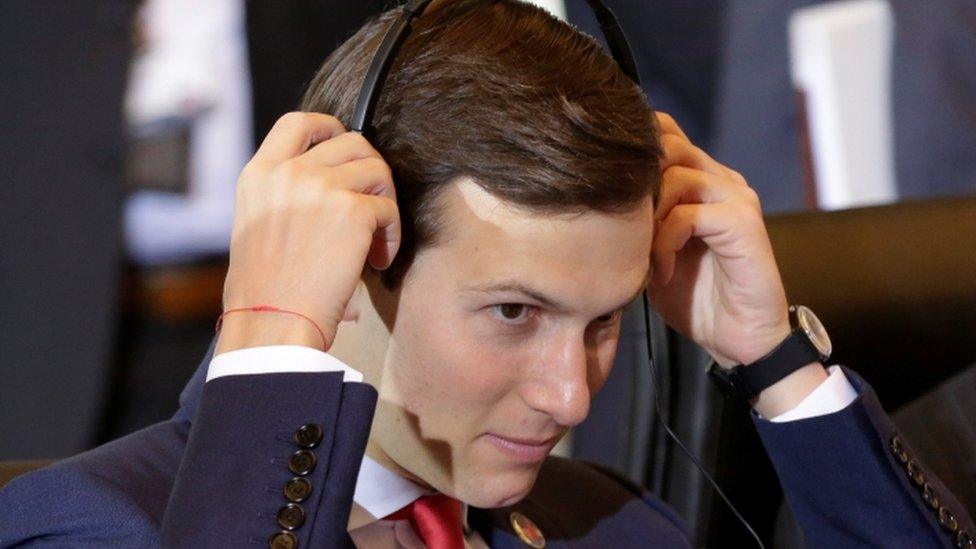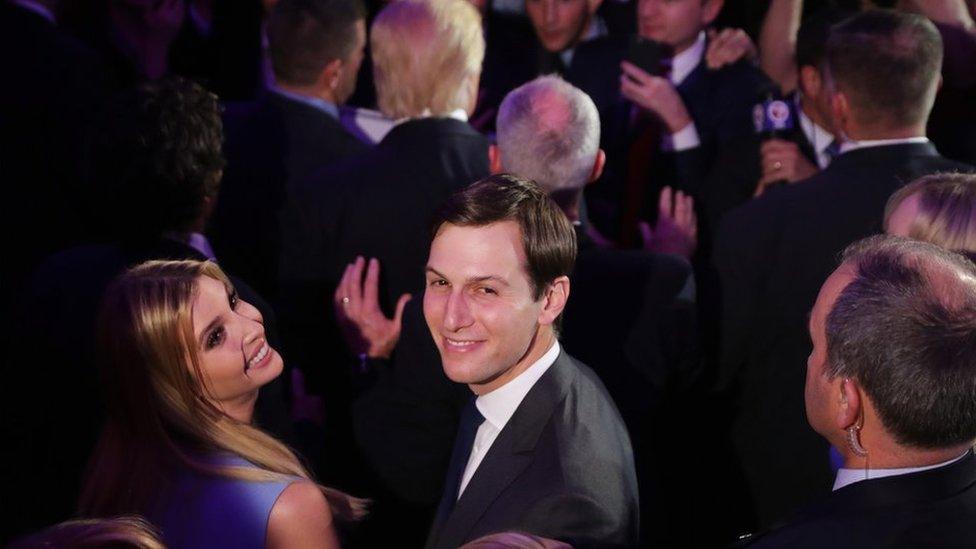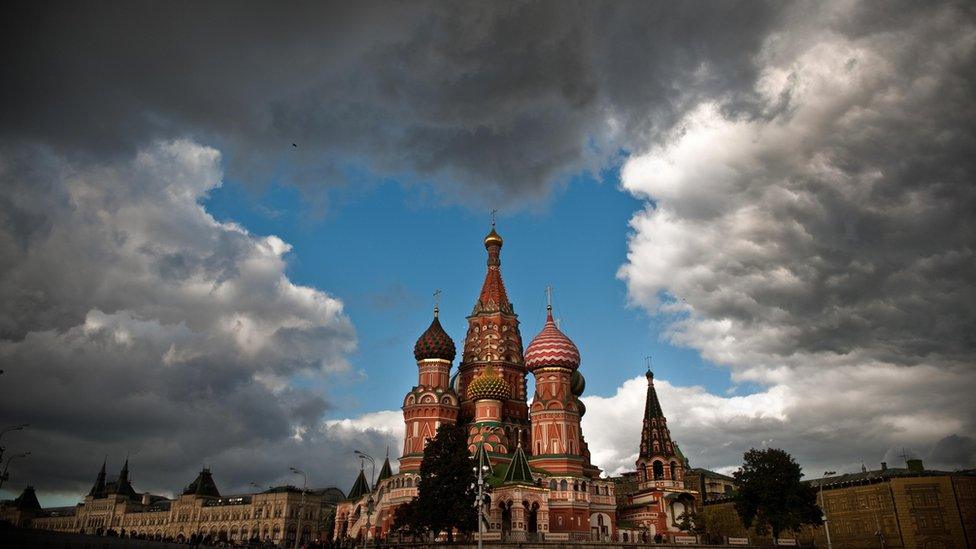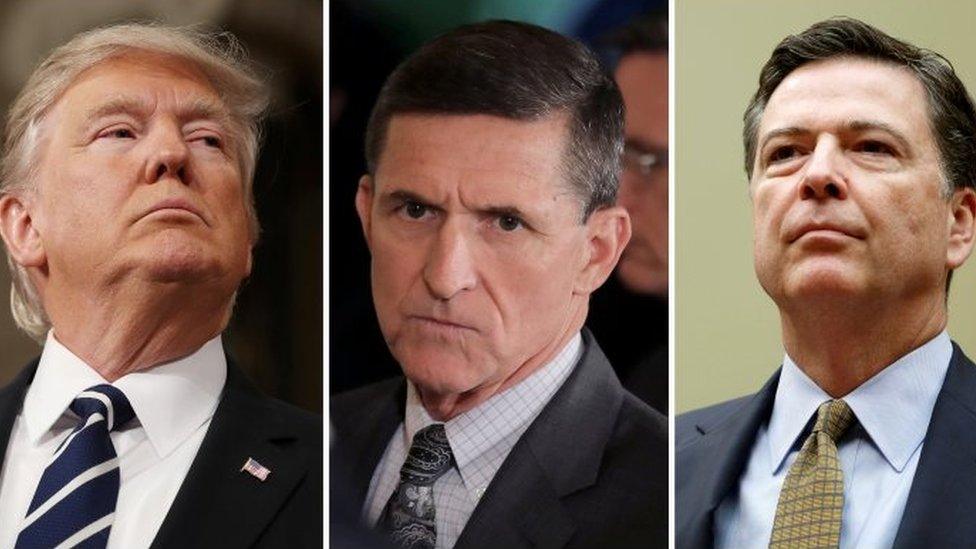US-Russia probe: Trump son-in-law Kushner denies collusion
- Published

Mr Kushner appears before the Senate on Monday and the House on Tuesday
President Donald Trump's son-in-law has said neither he nor anyone in the Trump campaign team colluded with Russian officials over the US election.
Jared Kushner said he had no improper contacts and did not rely on Russian funds to finance business activities.
Mr Kushner released his opening statement ahead of giving testimony before a Senate panel on Monday.
The Senate, the House and a special counsel are all investigating Russian interference in the election.
Mr Kushner, 36, is a senior adviser to the president and was in charge of the Trump campaign's digital strategy. He is married to Mr Trump's daughter, Ivanka.
Mr Kushner, who keeps a very low media profile, was due to attend a closed-door session on Monday before the Senate Intelligence Committee, and then appear before the House version on Tuesday.
In the statement, external to both congressional committees he released on Monday, he says: "I did not collude, nor know of anyone else in the campaign who colluded, with any foreign government."
"With respect to my contacts with Russia or Russian representatives during the campaign, there were hardly any," he says. At the end of the statement he speaks of "perhaps four contacts with Russian representatives" both during the campaign and after.
He does refer to a meeting with Russian lawyer Natalia Veselnitskaya in June last year. She had allegedly promised damaging material on Hillary Clinton.
Mr Kushner said he arrived late at the meeting, realised little of note was being discussed and that it was "time not well-spent".
The BBC's Sarah Rainsford tries to get Russian pop star Emin Agalarov to comment on his links to Donald Trump.
He said: "I actually emailed an assistant from the meeting after I had been there for 10 or so minutes and wrote 'Can u pls call me on my cell? Need excuse to get out of meeting'."
Mr Trump Jr said former campaign chief Paul Manafort was also at the meeting and that no compromising material on Mrs Clinton was provided.

Analysis: An exercise in caution
Anthony Zurcher, BBC North America reporter
In his Senate testimony Jared Kushner says he has nothing to hide and is "happy" to share information with those investigating possible Russian meddling in the 2016 presidential campaign.
His written statement, however, is an exercise in caution and lawyerly discretion. He addresses only the controversies already in the public sphere, then offers his explanation for why they are no big deal.
He receives hundreds of emails a day and didn't read his brother-in-law's forwarded message that said the Russian government wanted to help the Trump campaign.
Reports of an effort to set up back-channel communications with Russia after the election were a halted effort to get information about Syria from Russian generals.
He met with an influential Russian banker because the Russian ambassador - whose name he couldn't initially remember - was so persistent.
The incomplete security form was the result of a "miscommunication" with an assistant who submitted it too soon.
Beyond that, there are no new revelations; no new disclosures. If what's already out is all there is, Mr Kushner and his lawyers have done their best to defuse the bombs. When walking in a minefield, it's the ones you don't know about that pose the greatest risk.

One matter on which Mr Kushner may face a grilling is his security clearance declaration, as he accepts he failed initially to reveal his contacts with Russians.
He says the first form, a "rough draft that still had many omissions", was filed by an assistant in error on 18 January and that declarations on his foreign contacts, not just with Russians, were added over the next six months "in the normal course".

Mr Kushner on his meetings with Russians:

Ambassador Sergei Kislyak (above). Brief meeting of "pleasantries" in April 2016 in Washington. Meeting at Trump Tower on 1 December. Discussed Syria and trying to improve relations. Mr Kushner insists he did not suggest a "secret back channel" for communication or discuss sanctions. Mr Kislyak's term ended on Saturday
Sergei Gorkov. Mr Kushner says he met the banker on 12 December at the request of Mr Kislyak, who presented him as a man with direct links to President Vladimir Putin. Mr Kushner insists he did not discuss sanctions, business interests or specific policy issues and has had no contacts with him since
Guccifer400. Mr Kushner says he received a "random email" trying to extort 52 bitcoins in exchange for not publishing Mr Trump's tax details. Mr Kushner says he ignored the email
Natalia Veselnitskaya. Mr Kushner said he had not spoken to the lawyer before or since the June 2016 meeting and had forgotten about it until an email exchange involving President Trump's son, Donald Jr, came to light last month. He says: "No part of the meeting I attended included anything about the campaign, there was no follow up to the meeting that I am aware of, I do not recall how many people were there (or their names), and I have no knowledge of any documents being offered or accepted."

Mr Kushner was not expected to invoke his Fifth Amendment right against self-incrimination at the Congress meetings.
In his statement, he says: "I am happy to share information with the investigating bodies. I have shown today that I am willing to do so and will continue to co-operate as I have nothing to hide."
His statement concludes: "Hopefully, this puts these matters to rest."
Mr Kushner was also not expected to be under oath on Monday. However, what he says could be used against him at a later date and may well be passed to the special counsel, Robert Mueller, to help his investigation.
Adam Schiff, the top Democrat on the House intelligence panel, said: "There's a lot we want to know. We have a lot of ground to cover."
Mr Trump Jr and Mr Manafort had been scheduled to appear before Congress on Wednesday to testify but that has been delayed indefinitely as lawyers negotiate on the documentation and information to be discussed.
President Trump has repeatedly denied any collusion with Russia.
He continued his tirade against the investigation process on Sunday, tweeting: "As the phony Russian Witch Hunt continues, two groups are laughing at this excuse for a lost election taking hold, Democrats and Russians!"
Russia has also denied any involvement.

Six months of Trump
Commander in tweets: What we can learn from Trump's Twitter
- Published24 December 2020

- Published14 September 2018

- Published12 July 2017
